Key takeaways:
- Pre-production is critical for film success, involving careful planning, communication, and team assembly.
- Creating a flexible pre-production checklist helps manage logistics and make adjustments during unforeseen challenges.
- Balancing budget and timeline requires prioritizing essential expenses and maintaining transparency with the team.
- Regular evaluations and check-ins during pre-production foster open communication and help identify roadblocks early.
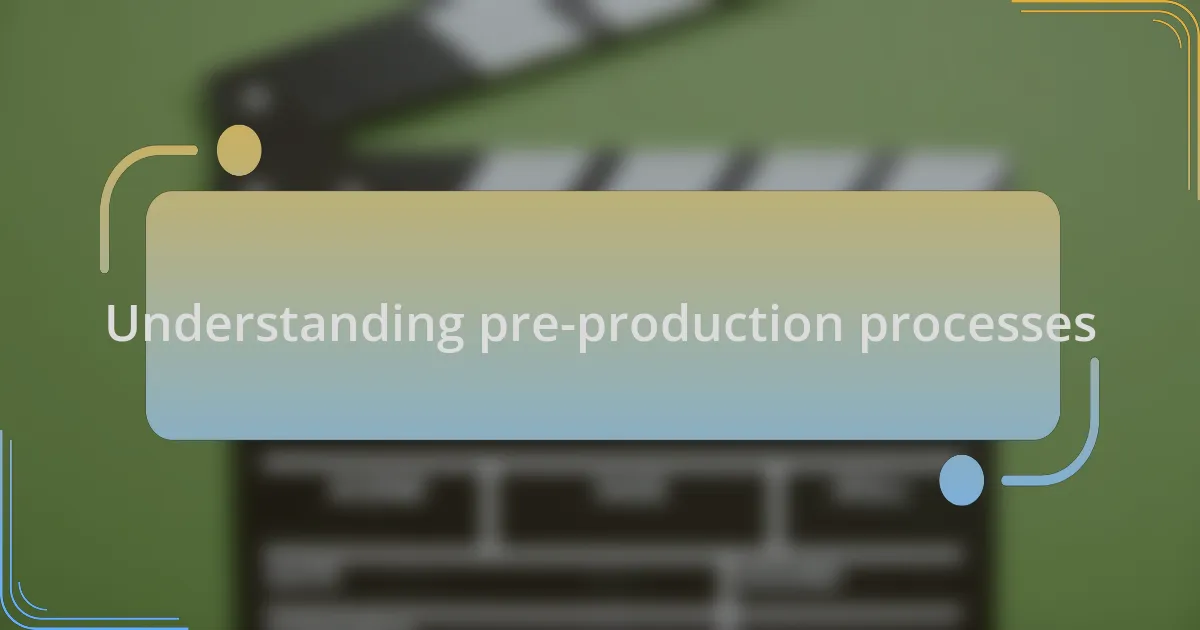
Understanding pre-production processes
Understanding the pre-production process is crucial for anyone venturing into film production. I vividly recall the first film I worked on, where we spent weeks ironing out the details. It was during those discussions that I realized every decision shapes the final film; it truly felt like laying the foundation of a house.
In my experience, pre-production is all about careful planning and communication. Think about it: a single misstep in scheduling can cascade, leading to chaos on set. When my team handpicked the crew and locations, we created a synergy that was palpable. The energy before shooting is electric, underscoring how vital this phase is.
Moreover, I often reflect on the budget discussions we had. They felt daunting at first; where to allocate funds seemed overwhelming. Yet, prioritizing aspects like casting and location became a thrill as we strategized, turning constraints into creative opportunities. Have you ever felt the weight of such decisions? It was exhilarating to navigate that complexity and emerge with clarity.
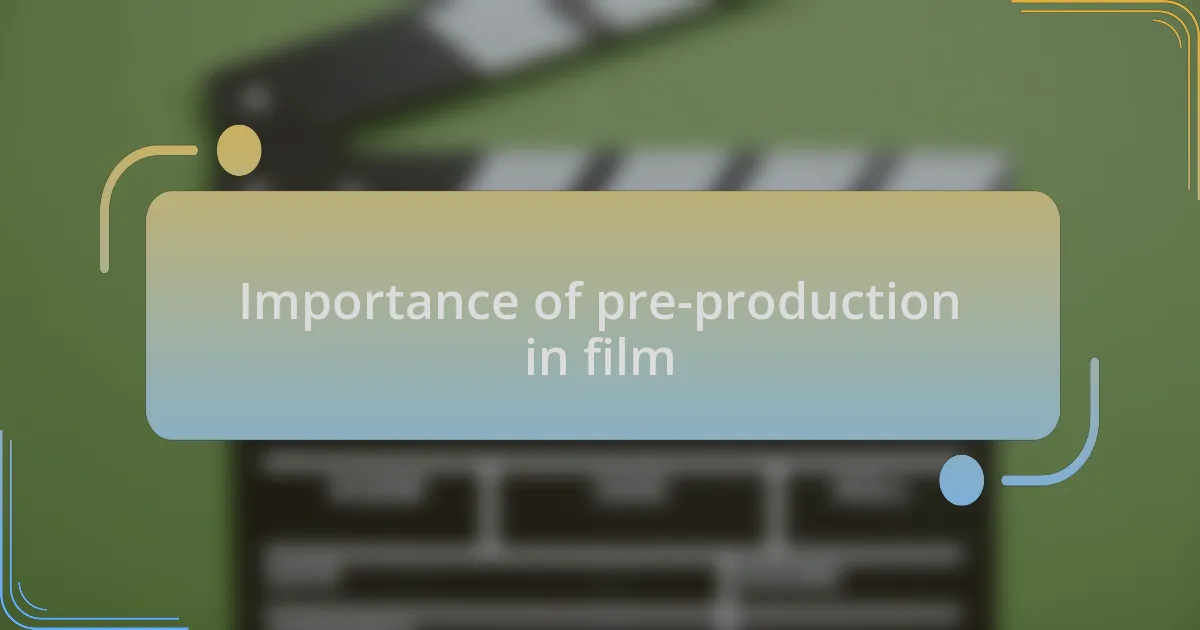
Importance of pre-production in film
Pre-production is the backbone of any film project, fundamentally shaping its trajectory. I remember a project where we met with the scriptwriter repeatedly to fine-tune the narrative. Those sessions were not just about words; they were about breathing life into the story, ensuring every character had depth. It’s moments like these that truly highlight how pivotal thorough planning is.
In my journey, I’ve found that pre-production involves addressing logistics that often seem mundane but are essential to success. Consider the time my team meticulously scouted locations, debating the emotional tone of each space. The right backdrop can elevate a scene from forgettable to unforgettable. Have you ever been in a location that just felt right? That’s the magic of choosing wisely during pre-production.
Another crucial aspect is assembling the right team. I recall a time when a last-minute cast change could have derailed our tight schedule. Instead, I saw it as an opportunity to rethink the character’s dynamics. It reiterated the importance of flexibility and intuition during this phase. How often do we underestimate the power of a well-prepared team? In film production, it’s everything.
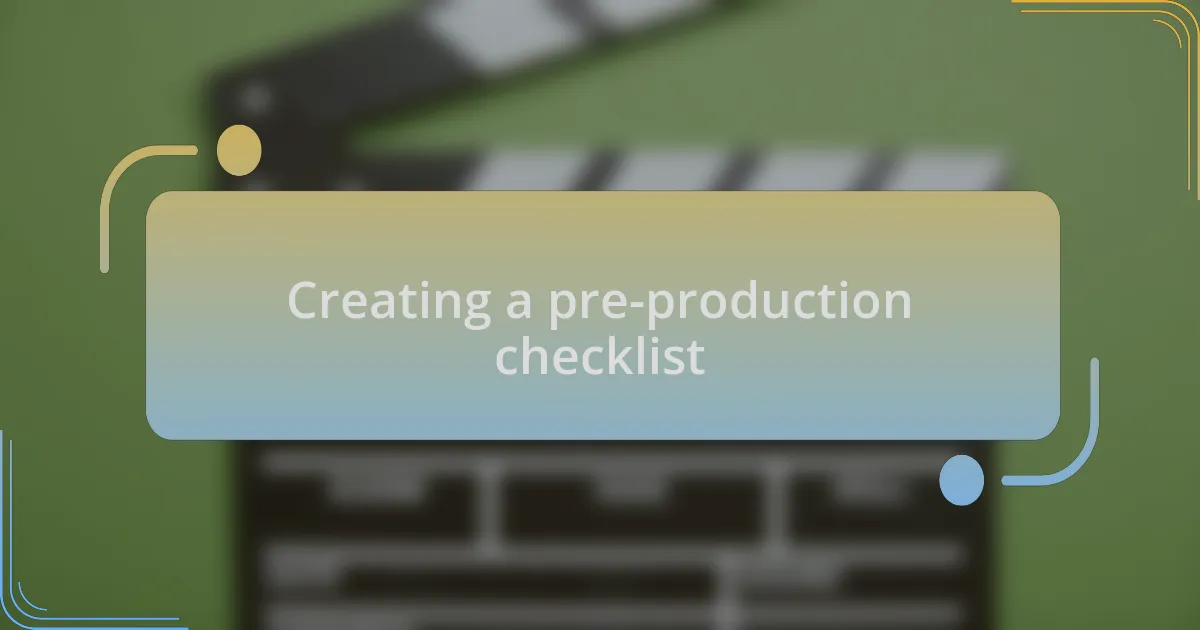
Creating a pre-production checklist
Creating a pre-production checklist is a fundamental step that I find invaluable. It acts as a roadmap, helping to visualize the entire project from different angles. I once jotted down a checklist for a short film I was directing, organizing tasks into categories like casting, location scouting, and budgeting. Each completed item felt like a small victory, propelling the project forward. Have you ever felt that wave of satisfaction when you check off a task?
When developing your checklist, consider the unique needs of your project. I remember working on a piece that required specific equipment to achieve its distinct visual style. By including detailed equipment lists and shot requirements in my checklist, I could avoid those last-minute scrambles that can lead to stress. Taking the time to think through each aspect can save a lot of headaches later on. What parts of your vision are non-negotiable for you?
Lastly, keep your checklist flexible. I learned this lesson when an unexpected weather change disrupted our initial shooting schedule. Having a checklist that allowed for adjustments meant that we could pivot without losing momentum. It’s about creating a living document that responds to the evolving needs of the production. How adaptable are your plans, and how do they influence your readiness for unforeseen challenges?
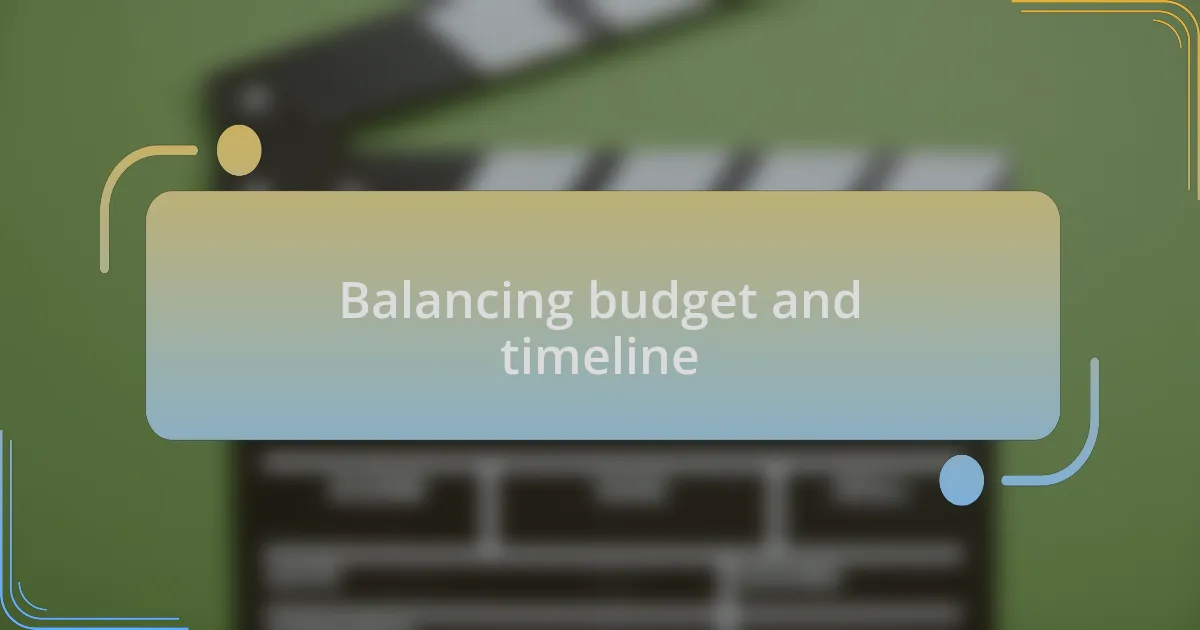
Balancing budget and timeline
Balancing budget and timeline often feels like walking a tightrope. I vividly remember a project where we had an ambitious timeline but a tight budget. I had to carefully assess each line item, making tough calls about which luxuries could be sliced away without compromising our vision. That experience taught me the importance of prioritizing essential expenses, like quality talent and locations, over less critical elements.
In another instance, when coordinating a series of short films, we faced an unexpected delay due to equipment malfunction. I had to weigh the cost of hiring additional resources against the potential impact on our timeline. That stressful moment revealed a crucial lesson: sometimes, investing a bit more upfront can save you from financial chaos down the line. What experiences have you encountered that forced you to make similar tough decisions?
As I’ve delved deeper into film production, I’ve come to appreciate that transparency with my team is vital for navigating these balancing acts. Keeping open lines of communication allows us to stay aligned and adjust our trajectory without compromising quality. Have you considered the role that consistent dialogue plays in your projects? It’s an essential practice that can prevent misunderstandings and ultimately lead to a more successful production overall.
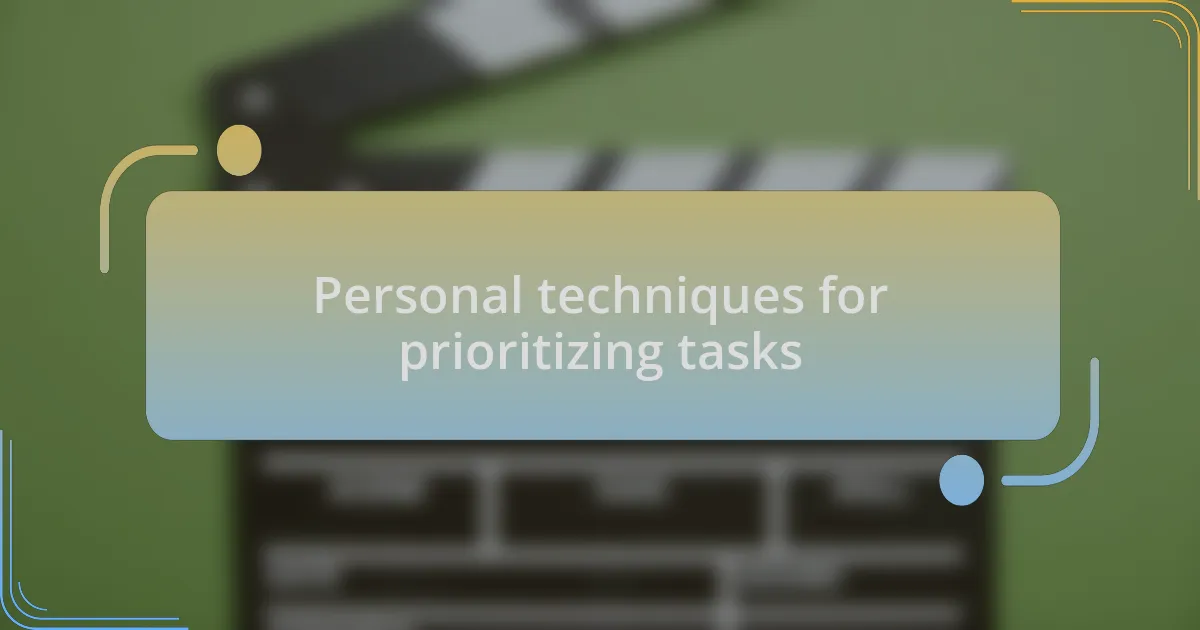
Personal techniques for prioritizing tasks
When it comes to prioritizing tasks, I rely on a method that I’ve found immensely effective: the Eisenhower Matrix. This technique helps me categorize tasks into four quadrants based on urgency and importance. I still remember the late nights brainstorming for a documentary shoot, where I learned that not every task deserves the same level of attention. By focusing on what’s truly urgent and essential, I was able to allocate my energy where it mattered most, ensuring everything flowed smoothly.
Another technique I often employ is breaking down larger tasks into smaller, manageable chunks. During one project, I faced the daunting challenge of coordinating multiple locations and cast members. By delineating those responsibilities into bite-sized pieces, I eased the overwhelm and gained clarity on what needed to be tackled first. It’s genuinely liberating to watch a once-massive workload transform into a series of achievable steps. Have you tried this approach? It can really change your perspective on daunting projects.
I also find value in keeping a priority checklist that I revisit daily. There was a time when I was juggling script revisions and location scouting simultaneously, and I felt completely lost. By jotting down what needed immediate attention every morning, I regained focus and a sense of control. It’s fascinating how the simple act of listing tasks can provide clarity and ensure that nothing slips through the cracks. Have you experienced that same sense of relief when you put your priorities on paper? It’s like having a roadmap guiding you through the chaos.
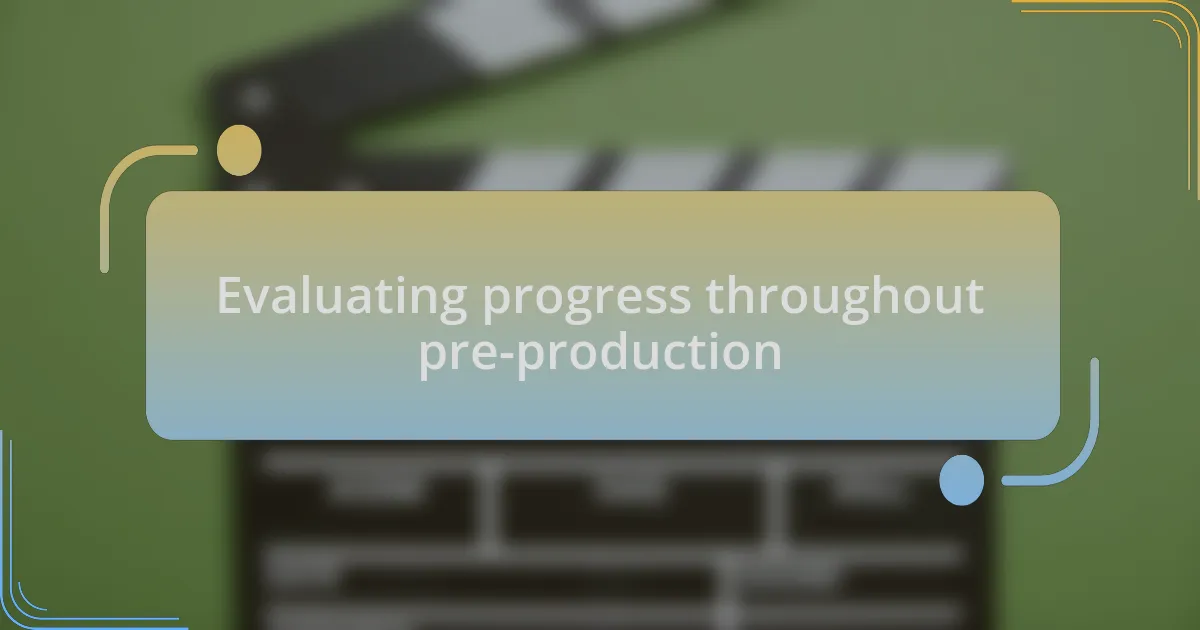
Evaluating progress throughout pre-production
Evaluating progress throughout pre-production is crucial for maintaining momentum. One method I use is setting specific milestones for each phase, much like the checkpoints I established during a challenging short film project. As I reviewed my progress against those milestones, I could identify any potential roadblocks early on, allowing me to pivot and adapt without losing steam.
Regular check-ins with my team have also proven invaluable. During pre-production for a larger project, I scheduled brief daily stand-ups. These meetings not only fostered open communication but also gave us a space to celebrate small victories. Have you ever felt the power of collective progress? It’s exhilarating to see the project come together when everyone is on the same page.
I embrace the practice of documenting reflections on what’s working and what isn’t. While working on a web series, I realized that some strategies were more effective than others. Keeping a journal of these observations not only enhanced my decision-making for the next project but also provided insight into my growth as a filmmaker. What insights have you uncovered when you take a moment to reflect? It’s amazing how those reflections can deepen our understanding of the entire production process.